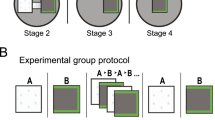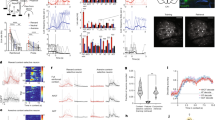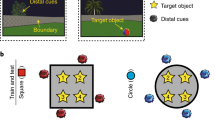Abstract
Although the clarity of many memories fades with time, some memories may maintain their original precision. Here we used a context discrimination procedure to evaluate whether the hippocampus is important in maintaining precision as memories mature. Spared discrimination in hippocampal-lesioned mice indicated that precise, remote context memories may be supported by extra-hippocampal brain regions.
This is a preview of subscription content, access via your institution
Access options
Subscribe to this journal
Receive 12 print issues and online access
$209.00 per year
only $17.42 per issue
Buy this article
- Purchase on Springer Link
- Instant access to full article PDF
Prices may be subject to local taxes which are calculated during checkout



Similar content being viewed by others
References
Frankland, P.W. & Bontempi, B. Nat. Rev. Neurosci. 6, 119–130 (2005).
Squire, L.R. & Bayley, P.J. Curr. Opin. Neurobiol. 17, 185–196 (2007).
Moscovitch, M., Nadel, L., Winocur, G., Gilboa, A. & Rosenbaum, R.S. Curr. Opin. Neurobiol. 16, 179–190 (2006).
Kim, J.J. & Fanselow, M.S. Science 256, 675–677 (1992).
Biedenkapp, J.C. & Rudy, J.W. Learn. Mem. 14, 200–203 (2007).
Wiltgen, B.J. & Silva, A.J. Learn. Mem. 14, 313–317 (2007).
Winocur, G., Moscovitch, M. & Sekeres, M. Nat. Neurosci. 10, 555–557 (2007).
Frankland, P.W., Cestari, V., Filipkowski, R.K., McDonald, R.J. & Silva, A.J. Behav. Neurosci. 112, 863–874 (1998).
Riccio, D.C., Ackil, J. & Burch-Vernon, A. Psychol. Bull. 112, 433–445 (1992).
Kirwan, C.B., Bayley, P.J., Galvan, V.V. & Squire, L.R. Proc. Natl. Acad. Sci. USA 105, 2676–2680 (2008).
Steinvorth, S., Levine, B. & Corkin, S. Neuropsychologia 43, 479–496 (2005).
Martin, S.J., de Hoz, L. & Morris, R.G. Neuropsychologia 43, 609–624 (2005).
Debiec, J., LeDoux, J.E. & Nader, K. Neuron 36, 527–538 (2002).
Tse, D. et al. Science 316, 76–82 (2007).
Winocur, G., Moscovitch, M., Fogel, S., Rosenbaum, R.S. & Sekeres, M. Nat. Neurosci. 8, 273–275 (2005).
Acknowledgements
We thank S. Josselyn, B. Wiltgen and A. Corvelo for comments on this manuscript. This work was supported by grants from the Canadian Institutes of Health Research (MOP-77561) and the EJLB Foundation (P.W.F.). C.M.T. and A.L.W. received support from the Ontario Ministry of Research and Innovation and the Ontario Mental Health Foundation, respectively.
Author information
Authors and Affiliations
Contributions
S.-H.W. and P.W.F. conceived and designed the experiments. S.-H.W., C.M.T. and A.L.W. performed the behavioral studies and carried out the statistical analyses. S.-H.W. conducted the lesions and histological analyses. P.W.F. supervised the project and wrote the paper with S.-H.W.
Corresponding author
Supplementary information
Supplementary Text and Figures
Supplementary Figures 1–4, Supplementary Methods, Supplementary Results and Supplementary Note (PDF 2851 kb)
Rights and permissions
About this article
Cite this article
Wang, SH., Teixeira, C., Wheeler, A. et al. The precision of remote context memories does not require the hippocampus. Nat Neurosci 12, 253–255 (2009). https://doi.org/10.1038/nn.2263
Received:
Accepted:
Published:
Issue Date:
DOI: https://doi.org/10.1038/nn.2263
This article is cited by
-
A new paradigm for investigating temporal order memory shows higher order associations are present in recent but not in remote retrieval
Experimental Brain Research (2022)
-
Metabolic fingerprints of fear memory consolidation during sleep
Molecular Brain (2021)
-
An inhibitory hippocampal–thalamic pathway modulates remote memory retrieval
Nature Neuroscience (2021)
-
Trajectory-modulated hippocampal neurons persist throughout memory-guided navigation
Nature Communications (2020)
-
A contextual binding theory of episodic memory: systems consolidation reconsidered
Nature Reviews Neuroscience (2019)



